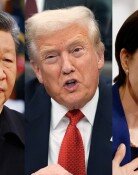China must rethink its proposal for a peace treaty
China must rethink its proposal for a peace treaty
Posted February. 19, 2016 07:33,
Updated February. 19, 2016 07:41
Chinese Minister of Foreign Affairs Wang Yi has proposed a negotiation to push for the twin agendas of denuclearizing the Korean Peninsula and replacing the existing armistice treaty with a peace treaty. “Pressure or sanctions cannot be the fundamental solution to controversial issues. Military means only lead to grave consequences and should never be used,” said the Chinese minister Wednesday. “The intent of my proposal will be conducive to fairly addressing the main concerns of each country and resolving the nuclear issue on the Korean Peninsula more fundamentally.”
“Once a peace treaty is signed, and once the North’s anti-U.S. policy, which is the root cause of the escalation of tensions, is abolished, all the other issues that concern the U.S. will be resolved once and for all,” said Minister Wang through the Rodong Sinmun on February 4, four days after the North conducted the fourth nuclear test. His remarks are in line with the proposal that he recently made. North Korea is demanding the conclusion of a peace treaty because it is seeking to achieve unification under communism by having its status as a nuclear power officially recognized and establishing diplomatic relations with the U.S. to induce withdrawal of American military forces from South Korea.
China is repeating the demand from the North verbatim like a parrot, which reflects the fact that China and the communist regime share certain security interests and strategic goals. China claims that a peace treaty is stipulated in the September 19 Joint Communique in 2005 and the February 13 Agreement in 2007, but the intention was to discuss the option of a peace treaty while making progress in the denuclearization effort, not to push for the twin goal at the same time. In addition, proposing a peace treaty as a solution to the North’s nuclear issues will be tantamount to justifying and North Korea’s nuclear development and compensating it with impunity and establishment of diplomatic ties with the U.S. It is certainly a pressing issue, but crowning the North Korean leader with a laurel wreath cannot be the answer.
The current state of armistice is the result of the UN Security Council resolution, which sent forth the Allied Powers to Korea during the Korean War, and the armistice treaty was signed by and between the Commander of the Allied Powers, who was American, and the Commanders of the North Korea and Chinese forces. South Korea opposed the ceasefire and did not sign the treaty. So once the armistice treaty is replaced with a peace treaty, it will undermine the legitimacy of the presence of the U.S. forces stationed in South Korea.
Peace treaties do not necessarily establish peace, either. In January 1973, the U.S. forces pulled out from Vietnam after the signing of the Paris Peace Accords, but Vietnam was soon communized as the North invaded the South in April 1975. In fact, this is what North Korea is aiming for. China must pressure the North strongly and make it give up on its nuclear arsenal, instead of misleading the true nature of North Korean provocations with unrealistic proposals.
한기흥기자 eligius@donga.com







